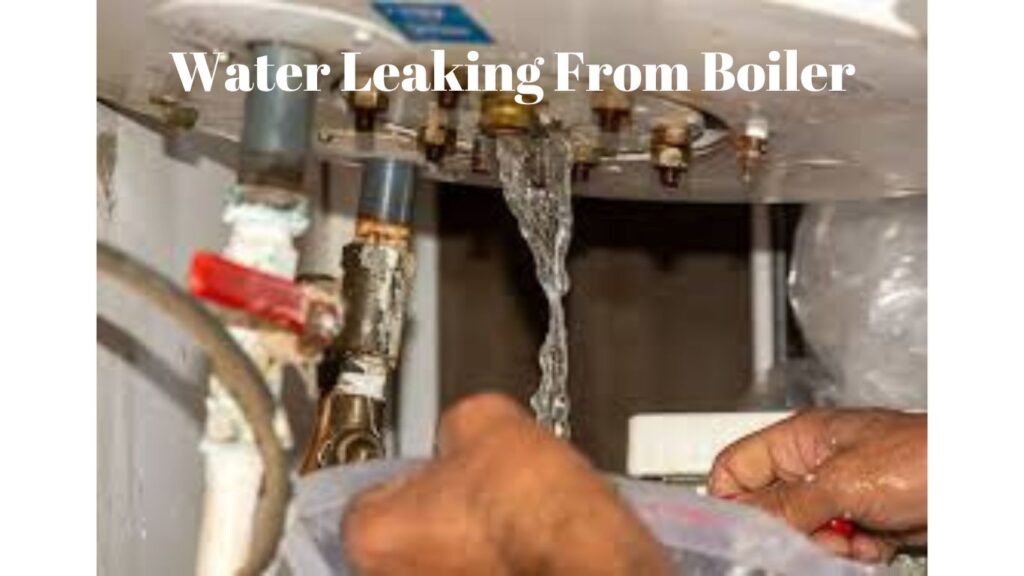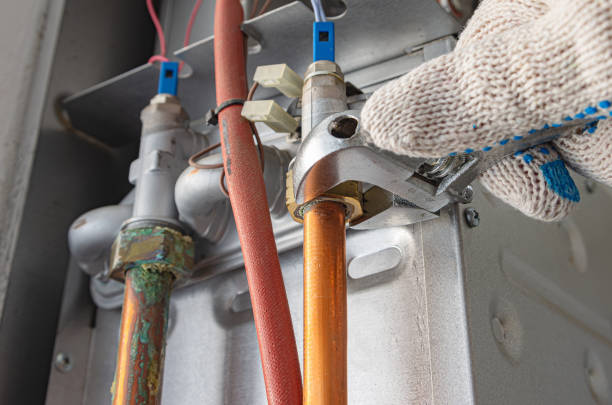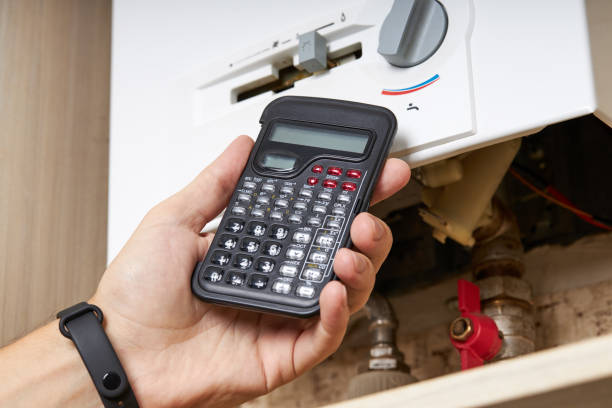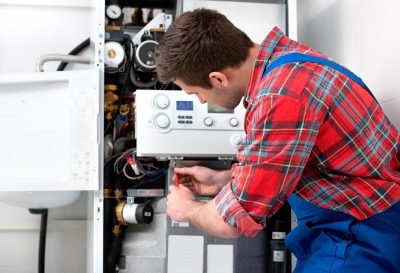If you notice your boiler leaking water leaking, it’s important to address the issue promptly. A leaking boiler can be a sign of a serious problem and should not be ignored. There are several possible reasons why your boiler may be leaking water, and in this article, we will explore some of the common causes and how to fix them.

Boiler Leaking Water
A boiler leaking water may result from corrosion, high pressure, a faulty heat exchanger where cold water is heated, loose joints, or high temperatures. Promptly pinpointing the leakage source, whether it be installation errors, component failures, or pressure issues, and addressing it prevents further home and heating system damage. Tackling leaks early is key.
Understanding Boiler Leakage
If you have noticed water leaking from your boiler, it is important to address the issue as soon as possible. Ignoring the problem can lead to further damage and potentially costly repairs.
Causes of Boiler Leakage
There are several possible causes of boiler leakage, including:
- Faulty Seals or Valves: Over time, seals and valves in your boiler can become worn or damaged from constant high temperature and pressure. This can cause the seals to become brittle and crack or valves to leak, leading to water escaping the boiler system.
- Corrosion: Corrosion is a common cause of boiler leakage and occurs when oxygen and pH levels in your boiler become unbalanced. This corrodes the internal components through oxidization. Things like acidic condensate, water impurities, and oxygen permeation through components can cause corrosion.
- High Pressure: If the pressure in your boiler becomes too high, it can put strain on components and cause leaks to occur. The high pressure can blow out weak seals or valves. Pressure may get too high if the boiler’s pressure relief valve fails or the system lacks adequate air removal.
Signs of Boiler Leaking
In addition to visible water around your boiler, there are a few other common signs that indicate you may have a leaking boiler:
- Strange Noises: If you hear unusual sounds coming from your boiler, such as hissing which indicates steam escaping or gurgling from water movement, it could point to a leak.
- Low Water Pressure: If you notice a drop in water pressure throughout your home’s plumbing system, it could be due to a leak in your boiler system causing loss of water. Check the boiler pressure gauge for drops.
- Higher Energy Bills: If your energy bills have suddenly spiked, it may be a result of your boiler working harder to heat water that is being lost through leaks. The boiler may run longer to keep up with demand.
- Condensation Outside Boiler: Excessive condensation on the external boiler jacket or pipes may indicate a leak inside the boiler. The water escaping condenses on the cooler external components.
- Boiler Cycling On and Off: If your boiler is quickly turning on and off, it may indicate it isn’t able to keep consistent pressure due to a leak. The pressure drops, triggering the boiler to cycle.
| Sign | Description |
|---|---|
| Water around the boiler | Pooling water around base of boiler |
| Damp patches | On walls or ceilings near boiler |
| Strange noises | Hissing or gurgling sounds |
| Reduced pressure | Lower reading on boiler pressure gauge |
| Higher water bills | Sudden increase in water usage |
| Condensation outside boiler | On external jacket or pipes |
| Boiler cycling on/off | Quick on and off operation |
Common Causes of Boiler Leakage
If you notice water leaking from your boiler, there are several possible causes. Here are some of the most common reasons why boilers leak water:
Faulty Pressure Valve
One of the most common causes of a leaking boiler is a faulty pressure valve. The pressure valve is responsible for regulating the pressure inside the boiler. If the pressure is too high, the valve will release some of the water to reduce the pressure. If the valve is faulty, it may release too much water, causing the boiler to leak.
Corrosion
Over time, boilers can develop corrosion on the inside, which can cause leaks. Corrosion can be caused by a number of factors, including exposure to oxygen, chemicals, and minerals in the water. If you have an older boiler, it may be more susceptible to corrosion.
Faulty Seals
Another common cause of boiler leaks is faulty seals. Seals are used to prevent water from leaking out of the boiler. Over time, seals can become worn or damaged, which can cause leaks. If you notice water leaking from your boiler, it may be due to a faulty seal.
Faulty Heat Exchanger
The heat exchanger inside your boiler can also develop cracks or leaks over time, leading to water escaping the system. Faulty heat exchangers are an expensive repair so this may indicate it’s time to replace the entire boiler.
High Pressure
If the water pressure within your boiler gets too high, it can cause pipes, valves, and seals to fail and spring leaks. Check your pressure gauge and relieve pressure if it’s at the top of the range.
The most common boiler leak causes stem from faulty components, corrosion, or high pressure. Getting annual service and maintenance can help avoid many leaks. But if you notice water dripping from your boiler, contact a heating professional right away.

Impact of Boiler Leakage
Boiler leakage can lead to various problems that can affect the efficiency and safety of your heating system. Here are some of the impacts of boiler leakage:
Water Damage
Boiler leakage can cause water damage to your property, which can be costly to repair. The water can seep into the walls, floors, and ceilings, causing rot, mould, and other structural damage. It can also damage your furniture, carpets, and other belongings, leading to further expenses.
Reduced Efficiency
Boiler leakage can also reduce the efficiency of your heating system. The water leaking from the boiler can reduce the pressure and temperature of the water, making it harder for the boiler to heat your home. This can result in higher energy bills and longer heating times.
Safety Hazards
Boiler leakage can also pose safety hazards to you and your family. The water leaking from the boiler can cause electrical components to malfunction, leading to short circuits and electrical fires. It can also cause gas leaks, which can be dangerous and even fatal.
Boiler Failure
If left unaddressed, boiler leakage can eventually lead to complete boiler failure. The water dripping from a leaky boiler can cause other issues such as rust and damaging electrical components or functions inside your boiler. This can result in costly repairs or even the need for a complete boiler replacement.
In summary, boiler leakage can cause significant damage to your property, reduce the efficiency of your heating system, pose safety hazards, and lead to complete boiler failure. It is essential to address any signs of boiler leakage promptly to avoid these impacts.

Higher Energy Bills
Increased energy usage due to the boiler compensating for leaks leads to inflated utility bills. Bills exceeding projected amounts can indicate a leak problem.
| Impact | Severity |
|---|---|
| Property damage | High if left unaddressed |
| Reduced efficiency | Moderate impact |
| Safety hazards | Potentially high risk |
| Boiler failure | High if leaks continue |
| Higher energy bills | Moderate impact |
Immediate Actions to Take When Boiler Leaks
If you notice water leaking from your boiler, it is important to take immediate action. Here are the steps you should take to prevent further damage:
- Turn off the power supply to the boiler – Before doing anything else, make sure to turn off the power supply to the boiler. This will help prevent any electrical hazards and further damage to the boiler.
- Identify the source of the leak – Once the power supply is off, locate the source of the leak. Check for any visible cracks, holes, or loose connections. If you are unsure, it is best to call a professional to diagnose the problem.
- Drain the system – If the leak is severe, you may need to drain the system. This will help prevent water damage to your home and further damage to the boiler. Follow the manufacturer’s instructions to safely drain the system.
- Call a professional – If the leak is severe or you are unsure how to fix it, it is best to call a professional. Attempting to fix the problem yourself can lead to further damage and safety hazards.
Remember, a leaking boiler should never be ignored. Taking immediate action can help prevent further damage and ensure the safety of your home.
Basic DIY Fixes for Boiler Leaks
While it’s best to have a professional boiler technician address any leaks, there are a few basic DIY fixes you can attempt in some cases:
Check for Loose Fittings
One common cause of minor boiler leaks is loose pipe fittings. If you see water dripping from a pipe connection to or from the boiler, try tightening the fittings. Use an adjustable wrench to give fittings an extra quarter-turn. Check if the dripping stops.
Top Up Low Pressure
Low system pressure can cause boilers to leak from seals and valves. Check the pressure gauge – if it’s low, topping up may resolve minor leaks. Refer to your boiler manual for proper fill pressure and refill slowly using the fill valve.
Drain Excess Pressure
High boiler pressure stresses components and can lead to leaks. If the gauge reads high, carefully bleed radiators and drain some water to reduce pressure. Open bleed valves one at a time and close once water squirts out.
Check for Obstructions
Debris in valves or corroded/damaged parts can prevent them from sealing fully, causing leaks. Carefully inspect valves and fittings for any obstructions or wear. If spotted, try gently cleaning or replacing the part.
Tighten Fittings
Work systematically around all boiler and pipe fittings, tightening any loose connections. First ensure the fitting is fully dry. Then use an adjustable wrench to tighten it an extra quarter to half turn if possible.
| Area | Potential DIY Fixes | Risk Level |
|---|---|---|
| Loose fittings | Tighten with wrench | Low |
| Low pressure | Top up boiler | Low |
| High pressure | Drain water | Moderate |
| Debris in valves | Clean/replace valves | Moderate |
| General fittings | Tighten connections | Low |
Safety Precautions
- Turn off the boiler before any work
- Read all manufacturer instructions
- Allow components to fully cool before handling
- Have a fire extinguisher nearby
- Wear eye protection
- Don’t overtighten fittings
Ignoring boiler leaks or improper DIY repairs can worsen issues. But carefully attempting basic fixes under safe conditions may resolve minor leaks. Know your limits and call in a pro if needed.
Professional Boiler Repair
If you notice water leaking from your boiler, it is important to seek professional boiler repair services as soon as possible. Attempting to fix the issue yourself can be dangerous and may result in further damage to the boiler.
When you contact a professional boiler repair service, they will send a qualified engineer to assess the problem. The engineer will inspect the boiler and identify the cause of the leak. Once the problem has been identified, the engineer will provide you with a quote for the repair work.
Professional boiler repair services have the expertise and equipment to repair a wide range of boiler issues. They will use high-quality replacement parts to ensure that the repair work is of a high standard and will last for a long time.
In addition to repairing the leak, the engineer will also carry out a thorough inspection of the boiler to ensure that it is functioning correctly. This will help to prevent future issues from occurring and will ensure that your boiler is working efficiently, which can help to reduce your energy bills.
Preventive Measures for Boiler Leakage
To prevent boiler leakage, it is important to take proper preventive measures. Here are some steps you can take to avoid boiler leakage:
1. Regular Maintenance
Regular maintenance is essential to ensure the proper functioning of your boiler. You should schedule an annual inspection and maintenance service for your boiler. During the inspection, a professional technician will check for any signs of wear and tear, corrosion, or damage that may cause a leak. They will also clean the boiler and replace any worn-out parts.
2. Proper Water Treatment
Proper water treatment is crucial to prevent boiler corrosion and leaks. You should use good quality water with low mineral content to fill your boiler. If the water is hard, it can cause mineral buildup, which can lead to corrosion and leaks. You should also use a water treatment chemical to prevent corrosion and scale buildup in your boiler.
3. Pressure Relief Valve
A pressure relief valve is an essential safety device that prevents your boiler from over-pressurizing. If the pressure inside the boiler exceeds the maximum limit, the valve will release the excess pressure. You should check the pressure relief valve regularly to ensure it is working properly.
4. Temperature Control
You should maintain the proper temperature in your boiler to prevent leaks. If the temperature is too high, it can cause the boiler to overheat, which can lead to leaks. You should install a temperature control device to monitor and control the temperature of your boiler.
5. Proper Insulation
Proper insulation is important to prevent heat loss and condensation in your boiler. If the boiler tank, if used, is not properly insulated, it can cause the water to condense and lead to leaks. You should insulate the pipes and the boiler to prevent heat loss and condensation.
By following these preventive measures, you can avoid boiler leakage and ensure the proper functioning of your boiler. Regular maintenance, proper water treatment, pressure relief valve, temperature control, and proper insulation are essential to prevent leaks.
| Maintenance Type | Frequency |
|---|---|
| Annual service | Yearly |
| Visual inspections | Monthly |
| System flush | Yearly |
| Pressure checks | Monthly |
| Seal/filter replacement | As needed |
| Bill tracking | Monthly |
| Leak detector | One-time install |

When to Replace a Leaking Boiler
While some leaks can be repaired, extensive leakage often indicates a boiler is beyond repair and needs replacement. Here are some factors to help assess when replacement is the best option:
Age of the Boiler
Boilers typically last 10-15 years. Persistent leaks in older boilers usually mean core components like the heat exchanger are failing due to wear and corrosion. Replacement is preferable to sinking money into an outdated system.
Cost of Repairs
Look at the repair costs in the past year – multiple leaks and repairs exceeding 30% of a new boiler’s price indicate replacement may be more cost-effective. Compare new boiler quotes to projected repair costs.
Efficiency
Aging, leaking boilers operate inefficiently, driving up energy bills. New Energy Star certified boilers can cut bills by 30% or more with enhanced efficiency features. Calculate the potential savings with a new unit.
Safety Issues
Leaking water, gas or exhaust can create hazardous conditions. While repairs might fix current leaks, older boilers are prone to developing new issues. Newer computerized boilers have added safety mechanisms.
Major Component Failure
If the leak stems from failure of the boiler’s heat exchanger, burner, or control unit, replacement is usually necessary. Repairing these core components often exceeds the cost of a new boiler.
| Factor | Severity | Replace? |
|---|---|---|
| Boiler age | Old | Yes |
| Repair costs | High | Yes |
| Efficiency | Low | Yes |
| Safety issues | High risk | Yes |
| Core component failure | Not repairable | Yes |
The decision depends on the boiler’s condition, cost-effectiveness of repairs, efficiency, and safety. If in doubt, get quotes on a new replacement boiler before investing in extensive repairs.
Frequently Asked Questions
Q: What should I do if my boiler is leaking water?
A: If your boiler is leaking water, it is important to turn off the power supply, shut off the water supply to the boiler, and contact a professional heating engineer for inspection and repairs.
Q: What are common causes of boiler leaks?
A: Common causes of boiler leaks include issues with the pressure relief valve, faulty seals or gaskets, corroded pipes, and internal component failures.
Q: Why is my boiler leaking water from the bottom?
A: If water is leaking from the bottom of your boiler, it could indicate a problem with the boiler’s internal components, such as a cracked heat exchanger or a faulty pump seal, which should be addressed by a professional immediately.
Q: Is a leaking boiler serious?
A: Yes, a leaking boiler should be considered a serious issue as it can lead to further damage to the system and potential safety hazards. Prompt attention and repairs are necessary to prevent further complications.
Q: Can I still use my boiler if it’s leaking?
A: It is not recommended to use a leaking boiler as it can pose safety risks and cause additional damage. It is important to have the issue inspected and repaired by a qualified professional before using the boiler again.

